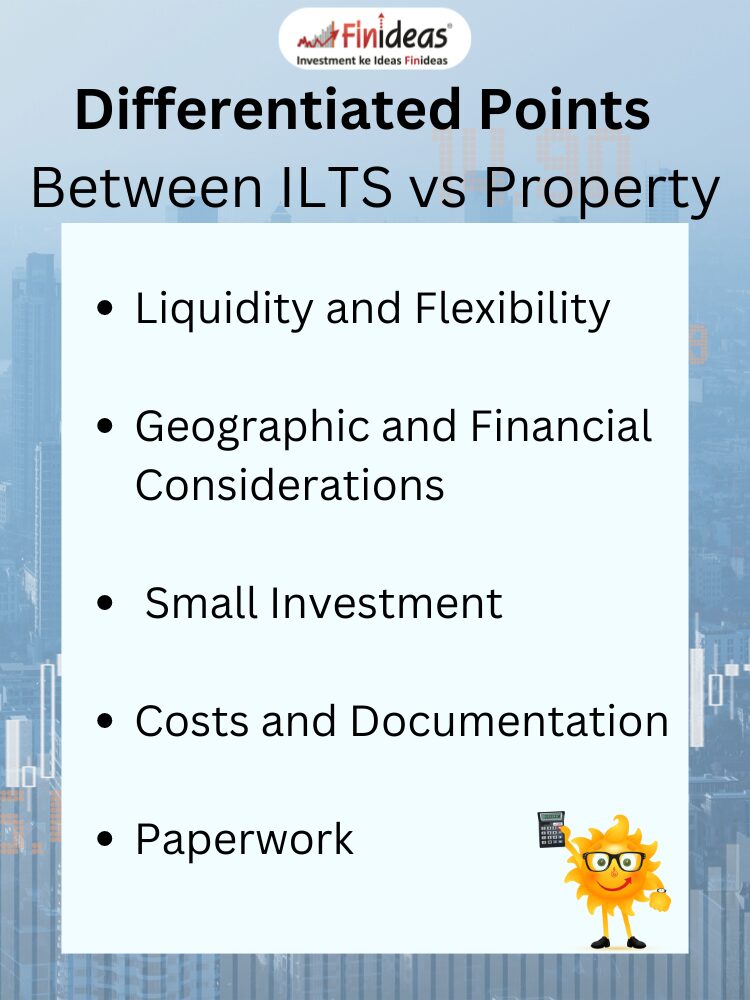ILTS vs. Property: A Detailed Comparison for Investors
When it comes to investing, selecting the right strategy can significantly shape your financial future. Two popular investment options are the Index Long Term Strategy (ILTS) and property investments. Each has unique advantages and drawbacks. This blog provides a comprehensive comparison of ILTS and property investments across several key aspects to help you make an informed decision.
1. What is Liquidity and Flexibility?
Liquidity
- ILTS: One of the standout features of ILTS is its high liquidity. Since ILTS involves trading on the stock market, investors can easily buy or sell their holdings at prevailing market prices. This flexibility is beneficial for managing an investment portfolio and responding promptly to market changes.
- Property: Property investments, particularly in real estate, generally offer lower liquidity. Selling a property can take considerable time and is heavily influenced by market conditions and the property’s location. The process of finding a buyer and completing a sale can be lengthy and uncertain.
Possible Withdrawal
- ILTS: Investors in ILTS enjoy the convenience of making partial or full withdrawals at their discretion. This allows for better cash flow management and the ability to capitalize on new investment opportunities as they arise.
- Property: With property investments, withdrawal typically means selling the entire property. Partial withdrawals are more complicated, often involving the sale of a property fraction, which is not as straightforward as selling a portion of a financial asset.
2. What are the Geographic and Financial Considerations?
Geolocation Dependency
- ILTS: ILTS investments are not tied to any geographic location. Investors can participate in the stock market from anywhere with access to trading platforms, making it a versatile option regardless of where you live.
- Property: Property investments are inherently dependent on their geographic location. The value and demand for a property are influenced by its specific location, local economic conditions, and real estate trends in that area.
3. What is Small Investment?
- ILTS: ILTS allows for relatively small investments. Investors can start with a modest amount and increase their investment over time, making it accessible for those with limited initial capital.
- Property: Property investments typically require substantial capital upfront. The costs associated with purchasing real estate, including down payments, closing costs, and initial repairs, can be significant barriers for individuals with limited financial resources.
4. What are the Costs and Documentation?
Maintenance Cost
- ILTS: ILTS has minimal maintenance costs. Investors do not need to worry about managing property, handling repairs, or covering ongoing expenses associated with physical assets.
- Property: Owning property comes with ongoing maintenance costs, including repairs, property taxes, insurance, and possibly homeowner association fees. These expenses can affect the overall return on investment and require continuous financial outlay.
5. What is the difference between both the Paperwork?
- ILTS: Investing in ILTS involves minimal paperwork. Opening a trading account and managing investments in financial markets usually require less documentation compared to real estate transactions.
- Property: Property transactions are paperwork-intensive, involving legal documentation, title deeds, and various regulatory approvals. The complexity and time required for these processes are significantly higher compared to managing a financial portfolio.
| Aspect | Index Long Term Strategy (ILTS) | Property |
| Liquidity | Full | Low |
| Possible Withdrawal | Partial or Full | Full |
| Geolocation Dependency | No | Yes |
| Small Investment | Possible | Not possible |
| Maintenance Cost | Low | High |
| Paperwork | No | Yes |
Conclusion
In conclusion, the choice between Index Long Term Strategy (ILTS) and property investments depends on an individual’s financial goals, risk tolerance, and preferences. ILTS offers high liquidity, flexibility, and lower entry barriers, making it suitable for investors seeking ease of management and accessibility. On the other hand, property investments provide the potential for long-term appreciation but come with higher upfront costs, lower liquidity, and more complex management considerations.
Which investment strategy do you find more appealing and why? Share your thoughts and experiences in the comments below!
Happy Investing!
This article is for education purpose only. Kindly consult with your financial advisor before doing any kind of investment.




